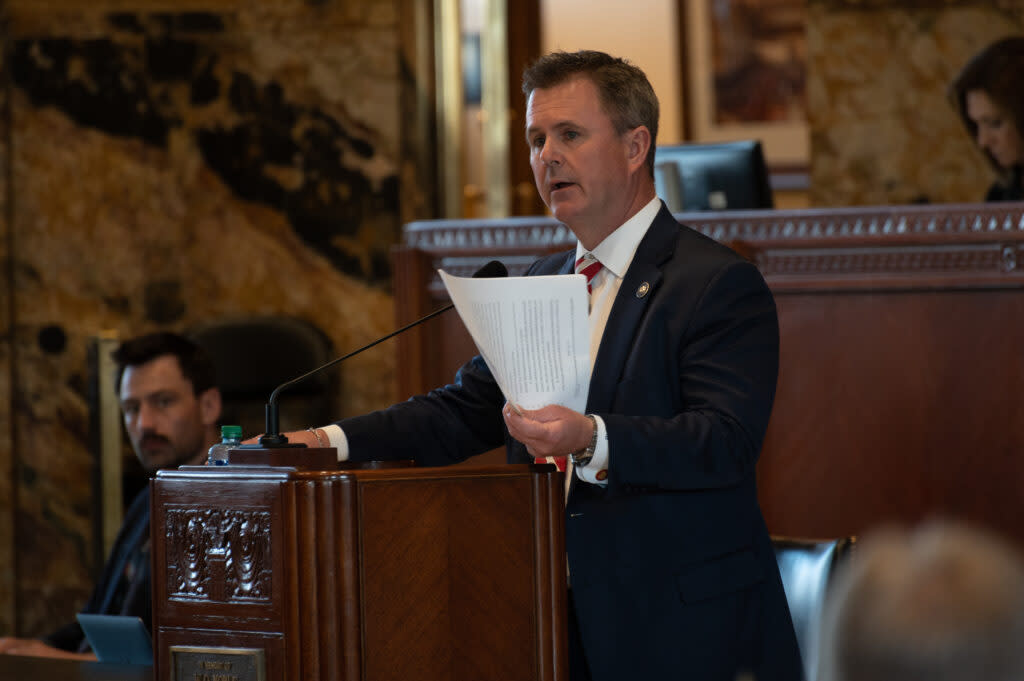Constitutional convention backers weigh in on changes to tax breaks on food, utilities

Rep. Beau Beaullieu, R-New Iberia, is carrying legislation that sets up the framework for a constitutional convention. (Allison Allsop/Louisiana Illuminator)
Two of Gov. Jeff Landry’s allies in his effort to overhaul the state constitution would personally support weakening protections around popular state sales tax breaks for residential utilities, prescription drugs and food purchased for home consumption.
State Rep. Beau Beaullieu, R-New Iberia, and former Louisiana House Speaker Jim Tucker, a Republican, on Friday said they would not personally want to lift those sales tax exemptions, but they don’t think such granular tax policy belongs in the state’s foundational governing document.
Beaullieu and Tucker support moving those types of tax items from the constitution to state statute during a constitutional convention proposed for this summer. The two men spoke during an online webinar sponsored by the Public Affairs Research Council of Louisiana.
Beaullieu said he also thought cigarette tax restrictions should be shifted from the constitution to statute as well. Louisiana cannot tax cigarettes below their 2012 rate because of a constitutional mandate.
“I think all of those tax items should be in statute,” he said. “If there is a better way to bring in revenue for the state, we need to be able to have that on the table.”
Beaullieu and Tucker’s remarks reflected their personal opinions and not those of Landry or the wider group backing the convention, they said. Landry’s office declined to comment on their discussion.
The sales tax breaks on food, residential utilities and prescription drugs could be more easily repealed if those provisions were shifted from the constitution into regular law as Beaullieu and Tucker suggested.
Outside of a convention, lawmakers can only take items out of the state constitution if they receive a two-thirds vote of the Louisiana Legislature and approval from voters on a statewide ballot. They can remove items from statute with only a two-thirds vote or simple majority of lawmakers and don’t need voter support to do so.
“Our ability of the Legislature to be flexible is very much limited because of the constraints of the constitution,” Beaullieu said.
Beaullieu and Tucker may not be interested in repealing the sales tax exemptions on food, residential utilities and prescription drugs, but other Republicans in the Legislature have floated the idea in previous years.
House Speaker Phillip DeVillier, R-Eunice, filed legislation in 2023 to repeal those tax breaks, though his proposal didn’t get very far in the lawmaking process.
Republicans oppose tax hikes in general, but some conservatives in the Legislature want to expand the state sales tax base in exchange for lowering or eliminating the income tax.
GET THE MORNING HEADLINES DELIVERED TO YOUR INBOX
It would be difficult to meaningfully replace money produced by the income tax – which brings in $4.4 billion every year – without significantly widening the sales tax base to large swaths of new products. The tax exemptions for food for home consumption ($555.2 million), prescription drugs ($334.4 million) and residential electric power ($260.6 million) add up to $1.2 billion annually, according to state’s annual tax exemption budget.
Advocates for low-income people have opposed proposals to swap out the income tax for broader sales taxes. Wealthy people and businesses pay the state income tax, but poor people do not. People who are struggling would carry a larger share of the financial burden of a sales tax on essentials like food, utilities and prescription drugs, according to the advocates.
Outside of lowering the income tax, Landry and the Republican legislative leadership are facing a massive budget shortfall next year when an automatic .45% reduction in the state sales tax is scheduled to take place. If lawmakers could more easily tax food, utilities and prescription drugs, they might be able to widen the sales tax base while still lowering the tax rate, and avoid massive budget cuts to higher education and health care services.
“If this convention is to deal with the fiscal cliff, they certainly should not deal with it by taxing basic necessities,” said Jan Moller, executive director of Invest In Louisiana, a left-leaning think tank that advocates for tax policies that help low-income people.
The governor has been pushing to hold a constitutional convention to overhaul the state’s budget and tax structure for months, but the legislation to call one, sponsored by Beaullieu, has stalled in the Louisiana Senate after passing the House. The Louisiana Senate and Governmental Affairs Committee hasn’t scheduled a public hearing on the bill yet.
Senators need more specifics from Landry about what he hopes to accomplish in a convention and what the process would look like, said Senate President Cameron Henry, R-Metairie, earlier this week.
Landry hadn’t been willing to share any details about what he hopes to see done during the event until this week.
During an education rally Thursday, the governor said one of the goals of the constitutional convention might be to find more money for his educational savings accounts proposal, which could devote hundreds of millions of dollars toward covering private school tuition for Louisiana residents.
If the Senate was to approve a convention, House Bill 800 calls for the convention organizational session to be held May 30, followed by pre-convention meetings in June and July.
The event would then take place from Aug. 1 to 15, and the new version of the constitution that it could produce would go before the voters for approval on the November presidential election ballot.
Louisiana’s 144 state lawmakers and 27 people appointed by Landry, including Tucker, would serve as the convention’s delegates.
The post Constitutional convention backers weigh in on changes to tax breaks on food, utilities appeared first on Louisiana Illuminator.

